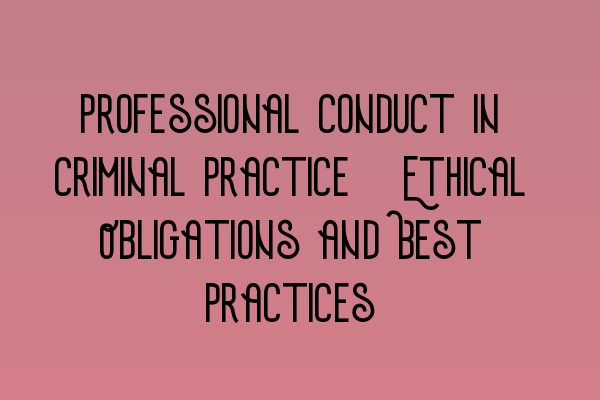Professional Conduct in Criminal Practice: Ethical Obligations and Best Practices
As solicitors specializing in criminal law, it is crucial to understand and adhere to the ethical obligations and best practices governing our profession. Upholding a high standard of professional conduct not only ensures the well-being of our clients but also maintains the integrity of the legal system.
Ethical Obligations
As legal practitioners, we must operate within the boundaries of professional ethics set forth by regulatory bodies such as the Solicitors Regulation Authority (SRA). Compliance with these obligations is essential to maintain public trust and confidence in our profession.
Confidentiality
One fundamental ethical duty is to maintain client confidentiality. We must protect the information shared by our clients, ensuring it remains private and not disclosed to any third party without their consent. This duty extends even beyond the termination of the client-solicitor relationship.
Conflict of Interest
Avoiding conflicts of interest is paramount in criminal practice. We must assess potential conflicts before accepting new clients to ensure we can act in their best interests without compromising our duty to existing clients. Adequate conflict checking procedures should be in place to prevent ethical breaches.
Professional Competence
Continuing professional development (CPD) is vital to maintain and enhance our knowledge and skills as criminal law solicitors. Staying updated with the latest legal developments and precedents allows us to provide reliable and accurate legal advice to our clients. SQE 1 Practice Exam Questions and SQE 1 Practice Mocks FLK1 FLK2 are useful resources to test and improve your knowledge.
Best Practices
In addition to ethical obligations, adopting best practices in criminal practice enhances the quality of our service and strengthens our reputation within the legal community.
Client Communication
Open and transparent communication with our clients should be prioritized. We must ensure they understand their legal rights, the progress of their case, and any potential outcomes. Providing regular updates and explaining legal complexities in a clear and concise manner builds trust and empowers clients to make informed decisions.
Thorough Case Preparation
To effectively represent our clients, thorough case preparation is essential. This includes conducting detailed legal research, gathering evidence, and meticulously analyzing the facts of the case. SQE 2 Preparation Courses and SQE 1 Preparation Courses offered by reputable providers can assist in honing your skills in these areas.
Professionalism and Respect
Exhibiting professionalism and treating all individuals involved in the legal process with respect is crucial. This includes maintaining a courteous demeanor with clients, opposing counsel, judges, and court staff. Upholding the highest standards of professionalism fosters positive relationships, encourages cooperation, and facilitates efficient case resolution.
To stay informed about SRA SQE Exam Dates and related updates, it is recommended to regularly check the official SRA website.
Conclusion
By adhering to ethical obligations and implementing best practices, we can fulfill our duty as solicitors in criminal practice. Upholding professionalism, maintaining client confidentiality, and continuously improving our knowledge and skills not only benefit our clients but also contribute to a fair and just legal system. Let us strive to uphold the highest standards of professional conduct in criminal practice.
